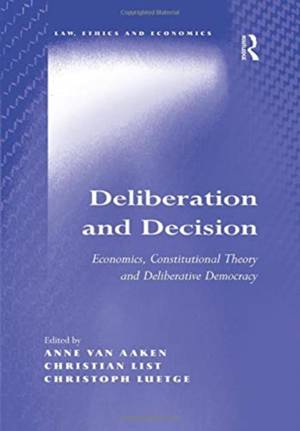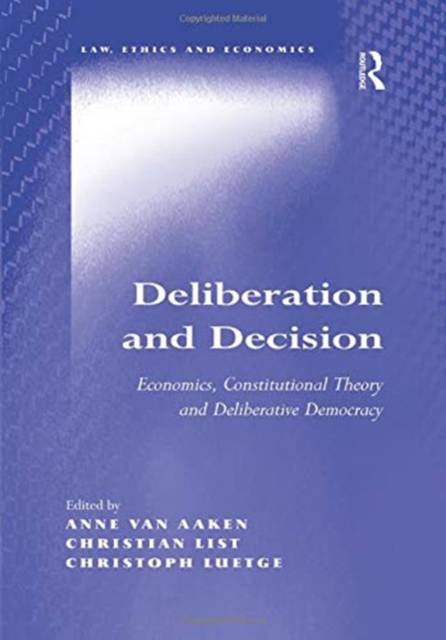
Door een staking bij bpost kan je online bestelling op dit moment iets langer onderweg zijn dan voorzien. Dringend iets nodig? Onze winkels ontvangen jou met open armen!
- Afhalen na 1 uur in een winkel met voorraad
- Gratis thuislevering in België vanaf € 30
- Ruim aanbod met 7 miljoen producten
Door een staking bij bpost kan je online bestelling op dit moment iets langer onderweg zijn dan voorzien. Dringend iets nodig? Onze winkels ontvangen jou met open armen!
- Afhalen na 1 uur in een winkel met voorraad
- Gratis thuislevering in België vanaf € 30
- Ruim aanbod met 7 miljoen producten
Zoeken
Deliberation and Decision
Economics, Constitutional Theory and Deliberative Democracy
€ 67,95
+ 135 punten
Omschrijving
Deliberation and Decision explores ways of bridging the gap between two rival approaches to theorizing about democratic institutions: constitutional economics on the one hand and deliberative democracy on the other. The two approaches offer very different accounts of the functioning and legitimacy of democratic institutions. Although both highlight the importance of democratic consent, their accounts of such consent could hardly be more different. Constitutional economics models individuals as self-interested rational utility maximizers and uses economic efficiency criteria such as incentive compatibility for evaluating institutions. Deliberative democracy models individuals as communicating subjects capable of engaging in democratic discourse. The two approaches are disjointed not only in terms of their assumptions and methodology but also in terms of the communication - or lack thereof - between their respective communities of researchers. This book provides a comprehensive overview of the recent debate between the two approaches and makes new and original contributions to that debate.
Specificaties
Betrokkenen
- Uitgeverij:
Inhoud
- Aantal bladzijden:
- 296
- Taal:
- Engels
- Reeks:
Eigenschappen
- Productcode (EAN):
- 9781138383463
- Verschijningsdatum:
- 23/08/2018
- Uitvoering:
- Paperback
- Formaat:
- Trade paperback (VS)
- Afmetingen:
- 152 mm x 219 mm
- Gewicht:
- 544 g

Alleen bij Standaard Boekhandel
+ 135 punten op je klantenkaart van Standaard Boekhandel
Beoordelingen
We publiceren alleen reviews die voldoen aan de voorwaarden voor reviews. Bekijk onze voorwaarden voor reviews.










